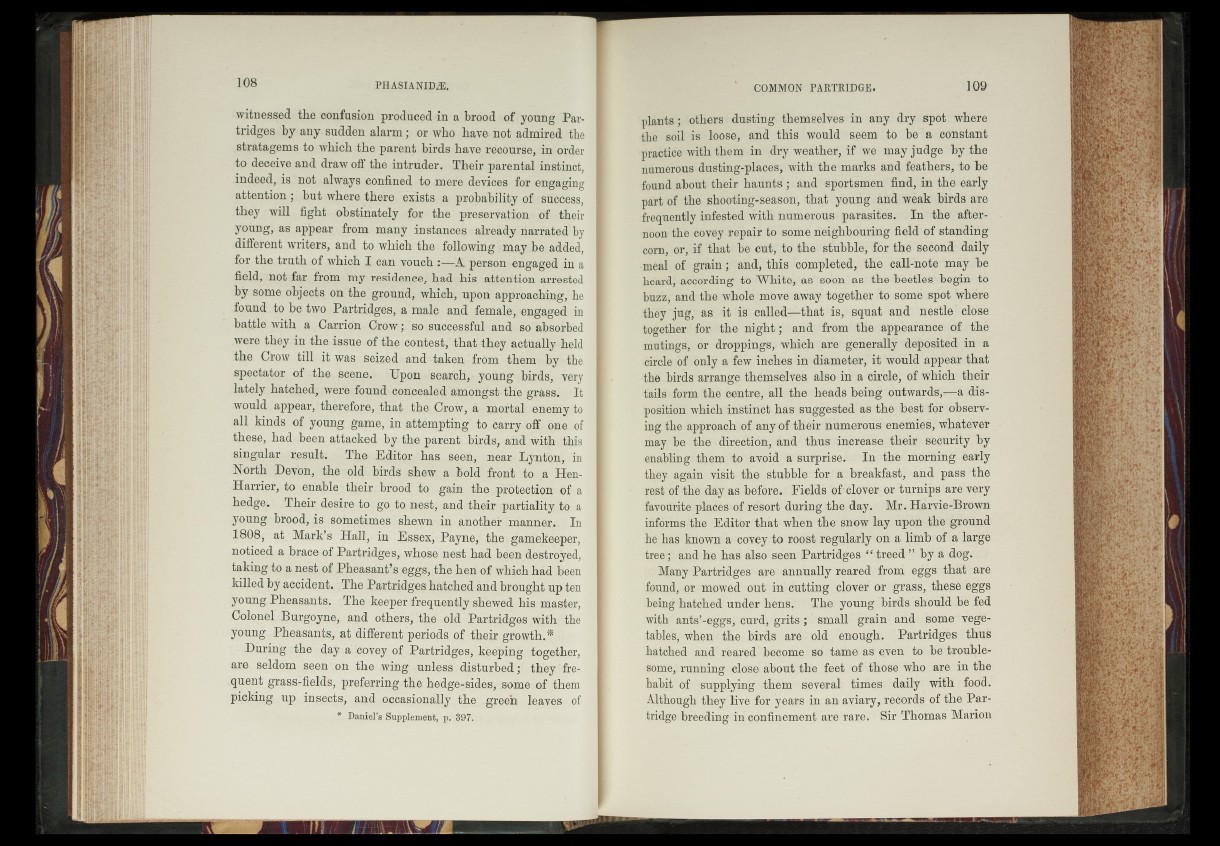
witnessed the confusion produced-in a brood of young Partridges
'by- any sudden alarm;; or who ham-hot admired the
stratagems to which the parent birds have recourse, in order
to deceive and draw off thé intruder. Their parental instinct,
indeed, is not always confined to mere devices for engaging
attention ; but where there exists a probability of -? success,
they will fight obstinately for the preservation - of » their
young, as appear from many instances •• already narrated <by
■different writers, and to which the following-;may.be added,
for the truth of which I can vouch A person engaged in a
field, not far from my residence, had his attention .arrested
by some objects on the ground, which, upon approaching,' he
found to be two Partridges, a male and-female,-engaged-'in
battle with a Carrion Crow ; 'so successful and.so' absorbed
.were they in thedssue -of the contest,--that-they actually-held
the Crow till it was seizediand -taken-from tbem^by^the
spectator of-the scene. --Upon search,>~yaüng <birds,4wery
lately hatched, were found concealed-amongst*the grass. It
would appear,’therefore,* that the Crow, a mortal enemy to
all kinds of-young .game, in atténqptingVt© carryofïV óne^of'
these, had. been attacked by the parent ‘birds, and with this
singular .. .result. - The .Editor has seen,, .near OLynthn»' in
North ‘Devon, the old birds shew, a bold front $$ a -Sen-
Harrier, to enable':their brood to gain the protection of a
hedge. Their desire-ip, go to nest, and -their -partiality Ito a
young brood,;^s .sometimes ’shewn-in another manner. Tn
1808, at Mark’s Hall, in’ Essex/ Payne,- the* gamekeeper,
nptjcfid a braceni-^artridges, whose nest had hóen destroyed,
taking to a nest of Pheasant’s ;eggs, the hen of>* which had been ;
.killed by accident..,The Partridges hatched and brought ujften }
young Pheasants. „Thé keeper frequently-shewed his master,
’Colonel : Burgoyne, and others; the old Partridges withathe j
young Eheasanfs, at different periods of their growth.f
During-the. day a covey of Partridges, ^keeping ’together,
are seldom .seen“on th e wing--,unless disturbed;! they'fre- !
uquent grass-fields, preferringthe' hedge-sides,rsome- of them i
picking up incepts, ,andtigccasiQnally the .green leaves ."of *3
* Daniel’s Supplement, -p.: 397. -
plants; others dusting themselves in-any dry spot , where
the soil is ; loose, and this would seem to he r a constant
practice with them in dry weather, if we may judge 'b y the
numerous dusting-places, with the marks and feathers, to be
found about their hatints; and sportsmen find, in the éarly
part of the shooting-season, -that 'young and weak birds are
frequently infested with numerous parasites. In the afternoon
the covey repair to some neighbouring field of standing
com, or,-if that'be cut, to tbe stubble/ for the second daily
meal of grain; and, this ‘completed, the call-note may be
heard/ according tb "White, -as' soon' as the beetles' begin to
buzz, and the whole move away together do some spot where
they jug, as it is calledé-that is, squat and nestle'close
together1 for the night; and from the appearance of thé
•mutings,-^ ór droppings, which are .generally deposited in a
circle óf only a few inches in diameter, it would appear that
the birds arrange themselves also in a circle/ of which their
tails form the centre, all the heads being outwards,-^a disposition
which instinct has suggested as the best for observing
the approach of any of their numerous enemies, whatéveir
may be Athe direction, and thus incréase' tlieir - security by
enabling them to'.avoid‘-a'surprise. : In- 'the’.morning eariy
they again-v-Mt the-stubble for’ &' breakfast, and pass the
rest of the,;day as before. Fields of'dover or turnips are very
favouriterp'laceS'of resort during the day. Mr. Harvie-Brown
informs tbe Editor; that when“ the-snow lay upon the ground
he has knownia": covey' to roost regularly on a limb of a large
tree; and he has also seen 'Partridges mfreed ’’dby-ar-dog; ...j
Many ^Partridges -are annually reared-'from eggs that'are
found, orimowed out. in cutting''clover or grass, these eggs
being,hatched under hens,' The youngTbifds should :be-fed
with ’ants’-eggs, ïfeurd;'grits ; ' small grain and some vegetables,
when ' the birds are jj old enough. Partridges thus
hatched and reared become 'so tame: as even to. be troublesome,
runi2iQg-7cl@se >about"the feet 'of those who are in thé
habit of' «supplying them several- times daily with food-.
Although they live for years ,in an aviary, records'of the Partridge
bréeding innonfi-nëment are rare. ' Sir-Thomas Marion